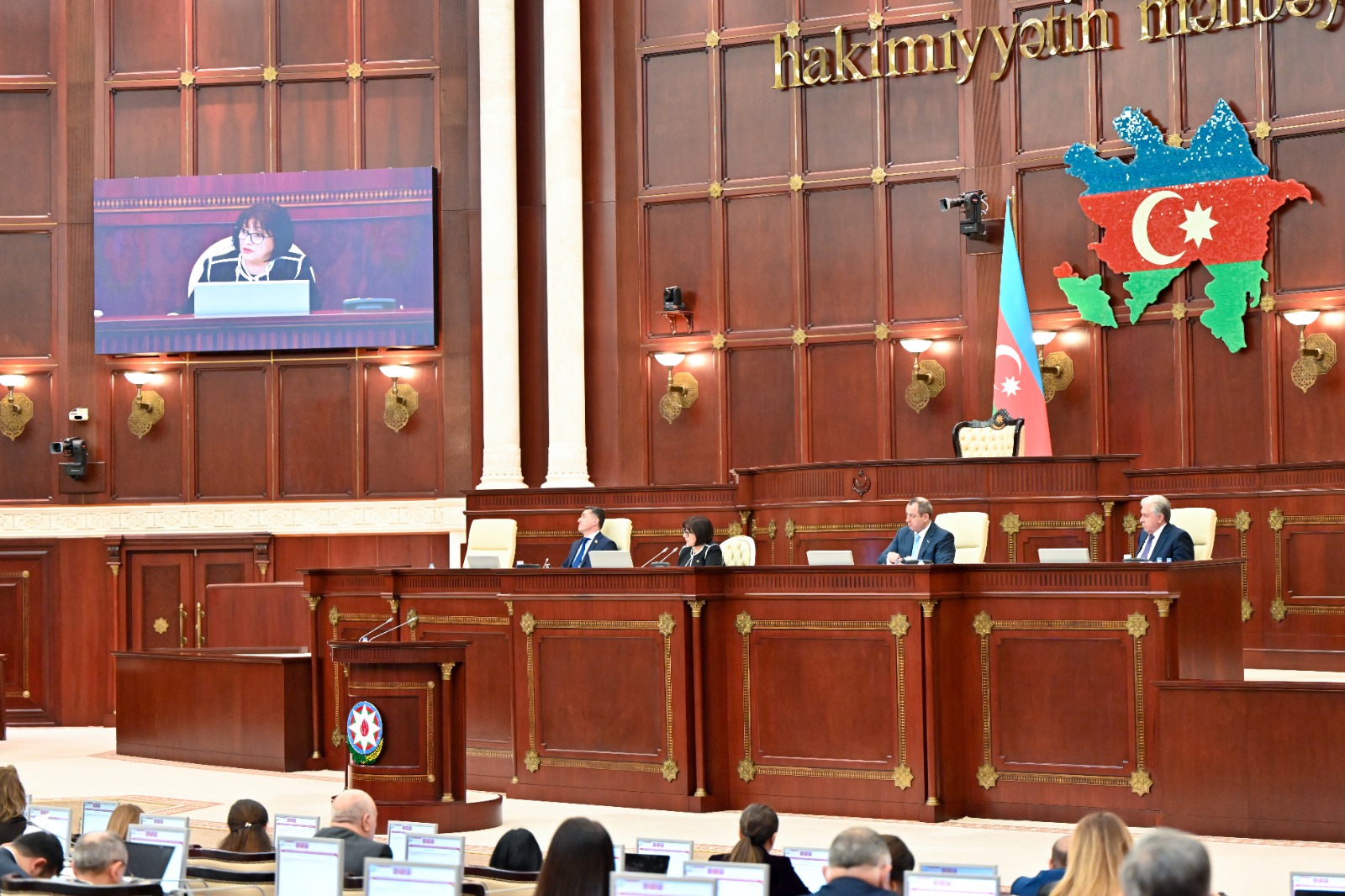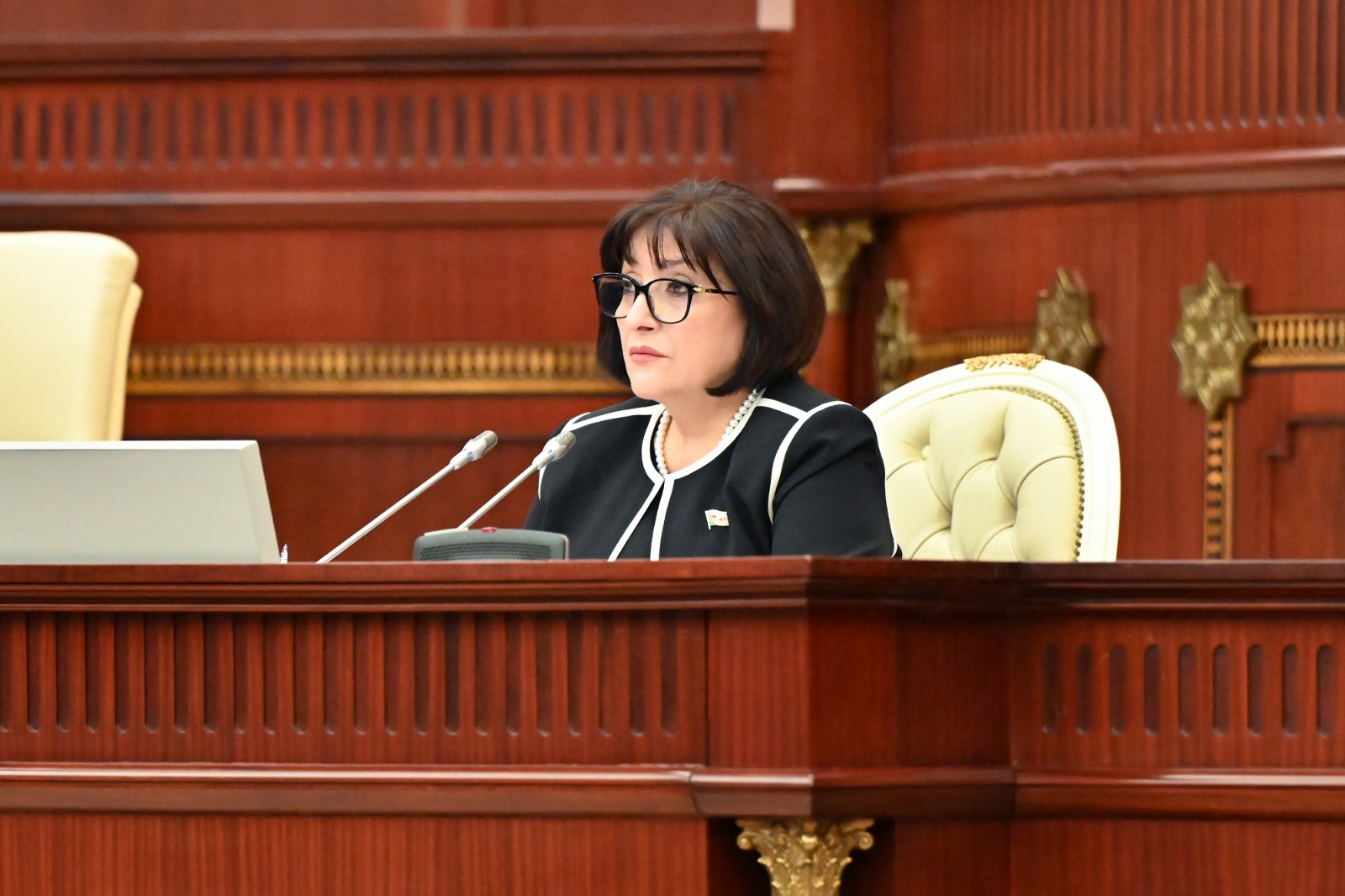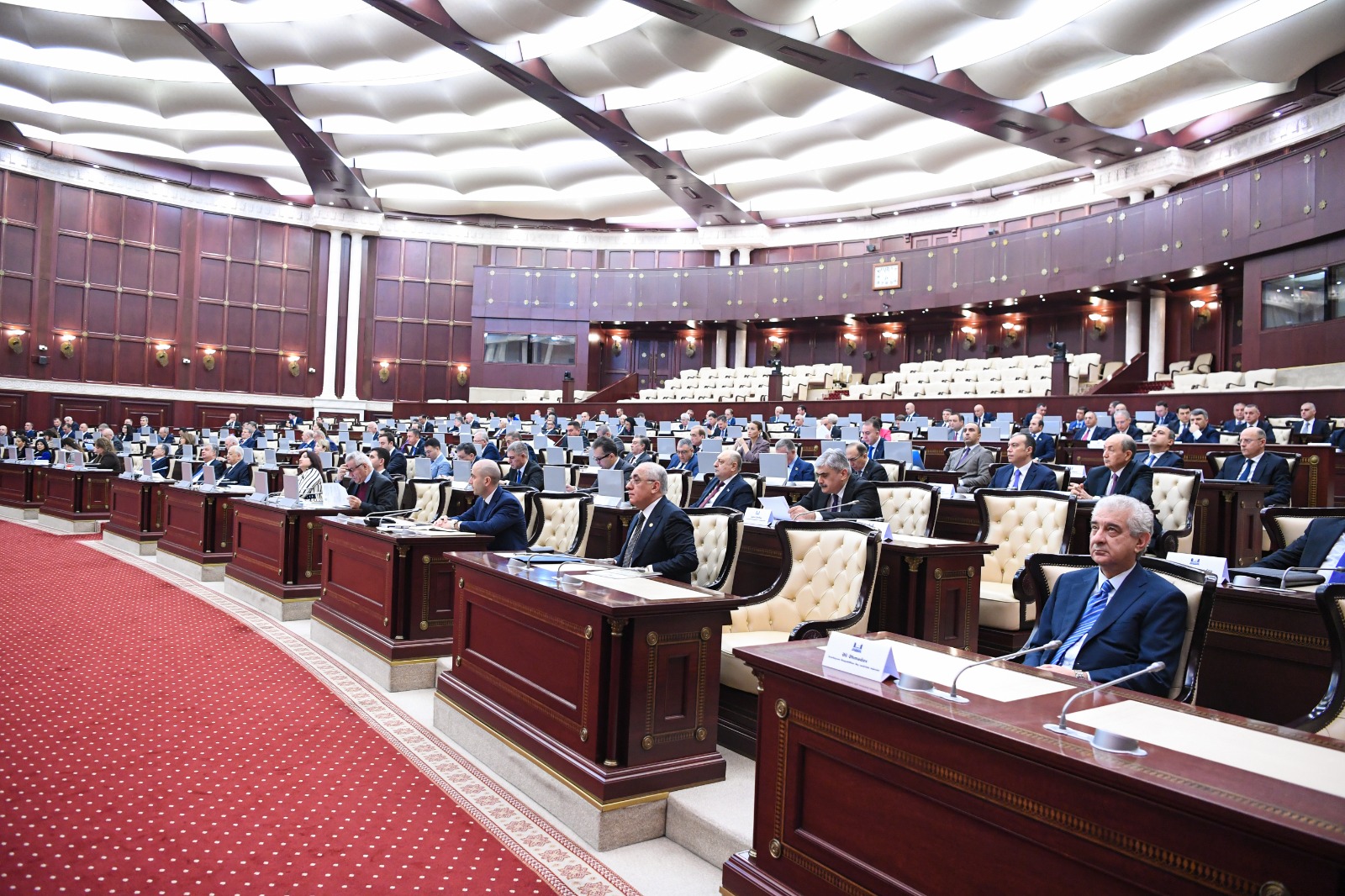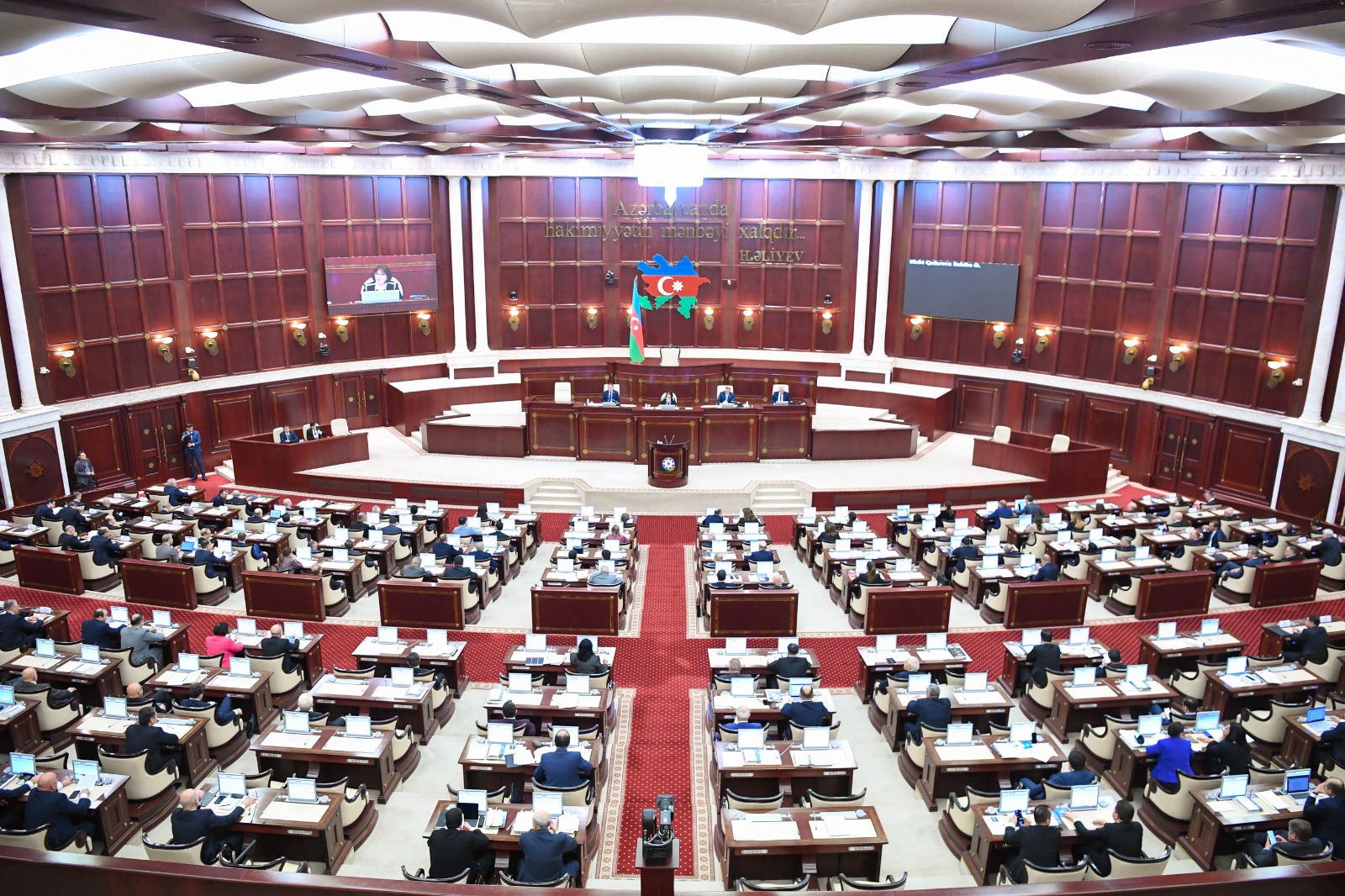Cabinet of Ministers Presents a Report at Milli Majlis Plenary Sitting
_1679066423_1683725669.jpeg)
Speaker Sahiba Gafarova said as she was opening the plenum of the Milli Majlis on 17 March that this, the first one in the spring session, was to hear the 2022 performance report of the Cabinet of Ministers as per the Constitution.
The successful strategy implemented by President Ilham Aliyev has further strengthened the country's macroeconomic and financial stability as well as has ensured fulfilment of the priorities and objectives of the national economic development and security policies. The establishment of the strategic national development goals by the Head of State made the Government's work more focused and effective, according to Madam Speaker.
Last year, Gross Domestic Product grew by 4.6%; the economic growth was largely driven by the non-oil sector, and the year’s exports more than doubled whilst the country's foreign exchange reserves grew by $5.3 billion to $58.5 billion over the year. The resources available to Azerbaijan today allow for large-scale infrastructure projects, and re-construction and building work proceeds rapidly in the territories liberated from occupation, Mrs Gafarova continued.
As the Head of state said in this regard, the level of development we have achieved is even more evident from that Azerbaijan is now one of the few countries in the world not depending on anyone in economic and political terms. Hearing the annual reports of the Cabinet of Ministers in the Milli Majlis facilitates intensive contacts between the Parliament and the Government whilst also involving the MPs in objective research and resolution of socio-economic development issues.
The proposals that were put forward during the discussion of the Cabinet report for the year before last in the Milli Mejlis were, as always, scrutinised by the Government. Detailed information on the status of their implementation was made available to the Parliament in a timely manner. In addition, for the past three years, these reports have also included information on the implementation of parliamentary proposals for the overhaul and construction of social and infrastructure facilities and the improvement of the quality of services.
As Mrs Gafarova remarked confidently, MPs will take active part in today's discussion as well, and will make rational proposals, at which point Mrs Gafarova gave the floor to Prime Minister of the Republic of Azerbaijan Ali Asadov who presented a report on the activities of the Cabinet of Ministers in 2022 to the Legislative Assembly.
According to MP Asadov, the international prestige of Azerbaijan increased, the national economy continued to develop, the national defence capability was enhanced and the social wellbeing of the population improved as a result of purposeful and successful foreign and domestic policy conducted under the leadership of President Ilham Aliyev. The Government took important steps in the reporting year to ensure economic activity, strengthen social protection of the population, restore liberated territories, increase national defence capacity and build the Army, develop the education and healthcare systems, and maintain food security.
The year past saw the Cabinet of Ministers pass 462 decrees and sign 820 orders. The 2022-2026 Socio-Economic Development Strategy that the Government had elaborated in line with the Azerbaijan 2030: National Priorities of Socio-Economic Development programme had been signed off by the President on 22 July 2022, MP Asadov told the House.
The Government's task is to achieve the goals laid down in the Strategy in the new stage of its implementation as well as to make our country a powerful state. In the 2022 Sustainable Development Report, by the way, the index of implementation of the UN Sustainable Development Goals is clear as to Azerbaijan’s having shown the best result in the region, ranking the 50th amongst 163 countries. Azerbaijan's economic growth continued in 2022 amid global geopolitical tensions and the Russia-Ukraine conflict, and despite the global economic uncertainties as well as recession risks.
The PM told the House that the GDP of 2022 had reached AZN 133.8 bn and was 4.6% up on 2021. The non-oil GDP in total and that put out by the non-oil industries and the agriculture specifically had risen by 9.1%, 7.1% and 3.4% respectively, Mr Asadov continued. The GDP per capita rose by 4.1% to AZN 13.3k. The volume of foreign trade amounted to approximately USD 56.2 bn last year with an increase by 57.7% compared with 2021. The strategic foreign exchange reserves rose by USD 5.3 bn to AZN 58.5 bn having been more than eight times the direct external state debt. Right now, PM Asadov told the MPs, our reserves equal USD 62.5 bn with the bimonthly growth by USD 4 bn. The direct external state debt had shrunk by 9.5% to USD 6.7 bn or 8.5% of the GDP by the y/e 2022. The tax and customs pickings of the year exceeded the forecasts by AZN 4.8 bn, which made it possible to revise the 2022 State Budget and raise its social and investment spending. Overall, the 2022 State Budget revenues and expenditures added up to AZN 31 bn and AZN 32 bn respectively.
The average annual inflation settled at 13.9%. Specifically, the domestic food inflation came under a serious impact from food prices due to the imports. Nevertheless, the balance of payments surplus in the context of high oil prices, the equilibrium on the foreign exchange market, the accepted parameters of the macroeconomic framework and monetary conditions relatively limited inflationary pressures. An action plan was approved by the Cabinet of Ministers on 21 February 2022 on “the Urgent Measures to Strengthen Anti-inflationary Measures". The steps taken by the relevant government agencies over the past year mitigated inflationary processes to a certain extent.
Ali Asadov also said that important work had been done to maintain the level of self-sufficiency in the domestic market and to improve the provision of basic foodstuffs – which work had been carried out in line with food security arrangements of the Government. Decisions were made to stockpile staple foods. Entrepreneurs engaged in supplying and processing those products in the minimum consumer goods basket were given loans, interest subsidies and tax and customs privileges on favourable terms. Last year, AZN 540 mn was spent on financing food security arrangements as part of the state financial support for agricultural producers. AZN 180 mn will be allocated for the implementation of relevant measures in 2023 pursuant to the presidential decree of 19 July 2022 “On a Series of Measures to Improve the Self-sufficiency in Food Wheat Supplies". In addition, AZN 208 mn has been allocated from the State Budget for the socio-economic advance of the provinces; the money was released to the relevant orders of the President. Steps were also taken last year to solve water problems important for the agriculture and food security. Water resources are used rationally. The main water reservoirs held 12.5 bn m3 by 1 January, 2023, which is 600 mn m3 more than in 2022 and 2 bn m3 up on 2020-2021.
A number of important decisions were taken last year as to strengthening social protection of the population by raising wages, retirement and other pensions as well as social allowances and benefits for the low-income strata of the society. The minimum wage was increased by 20% from AZN 250 to AZN 300, the minimum pension by 20% and the social benefits and presidential pensions by 26%. The monthly allowances rose by an average of 33%. In total, a package of social reforms was implemented during the year that encompassed 3.4 million people and entailed an additional annual financial burden of AZN 2.1 bn. AZN 11 bn 577 mn or 36% of State Budget’s entire expenditures of 2022 were allocated to finance social ends.
It follows from the report tabled by PM Asadov that more than 4500 flats were given to those handicapped whilst protecting the territorial integrity and independence of the country, as well as to shahid families and other families within the socially-vulnerable sections – all during the post-war period; 1,500 of the recipients were added specifically in 2022. AZN 365 mn of last year’s State Budget went down on social protection of the former refugees and IDP. In addition, special steps were taken to strengthen further the combat capabilities of the Armed Forces, build the Army in general, strengthen national security and improve the social and service conditions of the military personnel.
Azerbaijan's role in ensuring international energy security and development of transport corridors has increased further recently; our country has become the leading exporter of electricity in the region, according to Ali Asadov. As much as 21 bn m3 of gas were exported via the South Gas Corridor including 11.4 bn m3 that were pumped to Europe over the past year. The memorandum of strategic partnership in the field of energy that Azerbaijan and the European Union signed last year will have gas transportation via TANAP brought to 31 bn m3 from the current 16 bn m3, and via TAP to 20 bn m3 by 2027 (from 11 bn m3). At the same time, important work is being done to make effective use of the potential of renewable energy sources.
The demand for Azerbaijan's transport and transit infrastructure has also grown against a backdrop of geopolitical developments in the world and the region. Situated at the crossroads of the East-West and North-South transport corridors, our country is known as an important transport and logistics hub of the region. The transit freight traffic across Azerbaijan rose by over 75% last year. The construction, re-construction and rehabilitation of road infrastructure continued in the country as well. New opportunities for the development of transport and communication projects have presented themselves in the region since the Victory in the 44-day Patriotic War, and it is important in view of this to have new international and regional transport and logistics corridors, in particular the Zangazur Corridor, opened eventually.
The Prime Minister said that the presidential decree 16 November 2022 had sanctioned the First State Programme of the Great Return to the de-occupied lands of the country. A decree of the Cabinet of Ministers was signed to fulfil the tasks set in the programme. Then, Mr Asadov talked about the work done since the end of the Patriotic War to establish modern residential, industrial and service infrastructure in the liberated territories, to revive economic activities and to restore transport communications.
One of the memorable and historic events of the year past was the start of the repopulation of the liberated village of Aghali in the Zanghilan Province. On top of that, it is planned to relocate a group of Lachin people before the end of the current year. The international airport of Zanghilan, built to modern standards, was launched in the presence of the Presidents of both Azerbaijan and Türkiye on 20 October 2022. The Garabagh and East Zangazur economic regions were connected to the unified power grid of the country. As many as 11 HPPs are built in the freed provinces; the designing and construction of 19 motoring roads with the total projected length of 2,241 km went on there during the reporting period as well. The international airport of Lachin was under construction, besides. There are 18 industrial enterprises put on record in the Aghdam and Araz Valley Economic Zone industrial parks. Furthermore, 940 farms are registered. The two years past saw the aggregate of AZN 6.5 bn released from the State Budget towards the costs of refurbishing and reviving the de-occupied territories.
The 270th anniversary of Azerbaijan’s gem of Shusha was celebrated last year. There were many cultural and other events pursuant to the presidential decree declaring 2022 the Year of Shusha. At the same time, Shusha went on to be declared the Cultural Capital of the Turkic World in 2023.
Ali Asadov said as he was about to cap his presentation that the centenary of the National Leader of the Azerbaijanis, the founder of the independent Azerbaijani State, outstanding politician and statesman Heydar Aliyev was due on 10 May 2023. President Ilham Aliyev decreed on declaring the current year the Year of Heydar Aliyev to ensure the jubilee is celebrated nation-wide.
Then, MP Asadov talked about the importance of greater efforts to boost the independence of a modern, independent, secular and democratic Azerbaijan that the Great Leader Heydar Aliyev handed down and Ilham Aliyev is leading now. Such efforts are necessary for the continuing progress and prosperity of our Motherland.
The presentation by the PM was followed by speeches by the heads of the specialist committees of the Milli Majlis.
Chairman of the Economic Policy, Industries and Enterprising Committee Tahir Mirkishili the last few years’ economic reforms and large-scale projects driven by the state policy pursued under President Ilham Aliyev’s guidance, too, had contributed heftily to the national economic growth throughout 2022. At the same time, the favourable conditions had afforded the opportunities necessary to fulfil the tasks set for the Government by the Head of state. The report on the activities of the Cabinet of Ministers in 2022 as read in the Milli Majlis is comprehensive and contains the necessary information to assess the level of fulfilment of these tasks, in the opinion of the committee chairman.
Tahir Mirkishili put a stress on the report’s considerable focus on the implementing of more than a 100 proposals and recommendations made by MPs and the Chamber of Accounts. In the context of cooperation between the Milli Mejlis and the Government, an atmosphere of dialogue based on a broad exchange of information and debate allows for more effective implementation of the social and economic policies of the Head of State and brings greater benefits for citizens in all areas.
The Government made headway last year in restoring the liberated territories, increasing security, pushing economic activity up, maintaining financial stability and countering food shortage – and it all follows from the report.
Our country has the GDP, non-oil sector and agrarian growths by 4.6%, 9.1% and 3.4% to show for the reporting year respectively. Besides, the information and communication sector and the period’s non-oil exports had the corresponding increases by 14.8% and 12.4%; the strategic foreign exchange reserves rose to USD 5.3 bn, the exports exceeded the imports by USD 23.6 bn and the state foreign debt shrank by 9.5% to 8.5% of the GDP. All that as well as the financial stability and the State Budget’s stableness preserved are fine performance indications, Tahir Mirkishili was saying. He proceeded to mention the serious qualitative changes in administration, state-business relations within the tax and customs authorities and the quality reforms implemented during the year. He described the tax and customs collections’ having exceeded the corresponding projections by 32.4% and 22.8% respectively as an outcome of the fruitful efforts made by the specialist state agencies. He also called for more exacting planning in this field in the future.
Besides, Mr Mirkishili spoke favourably of the overall State Budget performance status. The 2022 spending plans’ performance by 99.3% was satisfactory, he finds. He also mentioned such a result of essential for the financial upkeep of the social policies as the fact that AZN 11.5 bn of the Budget’s total spending had gone down on social ends – including AZN 1.1 bn spent on compulsory medical insurance.
Mr. Mirkishili described as a good indicator the fact that 4.5 mn citizens had received benefits under the compulsory health insurance, the number of private medical institutions involved in providing these services had risen to 111 and, on average, the salaries of doctors on the minimum wage had increased threefold in the reporting year. At the same time and in view of those positive results, Mr Mirkishili proposed to extend the deferral of collection of compulsory health insurance premiums from non-working and non-entrepreneurial persons for another 3 years. He also commented on the collection of compulsory health insurance contributions and access to health services for all citizens.
The parliamentary committee chairman praised the leap in production thanks to the financial allocations from the State Budget to the agriculture. He was equally laudatory about the accumulation of reserve food stocks in the country, and talked about the importance of consolidating lands and refurbishing irrigation networks in view of the mounting water accessibility problems.
The need for qualitatively new approaches in this area as well as a high level of state financial control in it was duly highlighted. According to Mr Mirkishili, there is already a legal effect of the efforts made after the loss of funds incidents but the economic effect is not so great. This problem is not only in the public sector but also in the private sector. For example, violations of tax laws and financial discipline were identified in 98.7% of scenarios covered by tax audits in the past year. So, financial planning and accounting discipline now require proactive mechanisms.
The Central Bank’s monetary policy aimed at mitigating inflationary pressure had demonstrated its effectiveness during the year under review, in the opinion of Mr Mirkishili who also voiced appreciation of the efforts made by the Ministry of Finance to develop the securities market and of the work done by the Ministry of Economy to boost the national industrial potential in 2022. A good result was AZN 1 bn’s worth of outputs in the industrial zones as were the export sales that that had reached AZN 1 bn. The Open Budgets Index 2021 published last year had had Azerbaijan score 57 out of the possible 100 points and move up from the 81st to the 44th position amongst the 120 countries covered. Our country is one of the most advanced in this ranking, in Mr. Mirkishili's opinion.
Last year also stood out for fruitful co-operation between the Parliament and the Government having resulted in significant qualitative improvements in legislation, economic policy and budgetary projects, according to Tahir Mirkishili, who found the 2022 Report of the Cabinet of Ministers very acceptable and wished the Government further successes in the current year, one full of new opportunities but also ripe with new challenges.
With Mr Mirkishili’s review done, the Government’s annual report received comments by Chairman of the Natural Resources, Energy and Ecology Committee Sadig Gurbanov, Chairman of the Agrarian Policy Committee Tahir Rzayev and Chairman of the Labour and Social Policy Committee Musa Guliyev. Several proposals were put forward.
Sadig Gurbanov pointed out that the economic policy implemented under the leadership of President Ilham Aliyev had ensured national energy security, increased reliability and sustainability of power supply to the country’s economy and population. Praiseworthy steps had been taken in environmental protection and balance, rational use of natural resources and ensuring environmental safety. The year past had seen the much-needed work done to ensure the rational use of available water resources and the expansion of the use of advanced and cost-effective irrigation methods and installations in agriculture.
Tahir Rzayev said that the report had been compiled ideally and embraced all the economic, political, social, cultural and administrative facets of the country’s life. The agrarian GDP of 2020 had made AZN 10 bn 984.2 mn in actual prices whilst the agrarian outputs had been 3.4% up on 2021 including by 3.3% in the crops and 3.4% in the animal sector. The figures telling of agricultural growth result from the reforms in the sector, the care taken of farmers and the enlightenment undertakings.
Musa Guliyev Musa Guliyev said that the Government had duly fulfilled its tasks in 2022, during which it had maintained macroeconomic stability, taken effective steps to eliminate the adverse consequences of inflation and improve people's welfare, increased average monthly salaries, pensions, allowances and other social benefits, and made decisions to ensure social protection of the people. Mr Guliyev mentioned the coverage of 122,000 people with the 264 social support initiatives, the housing provided to 4,500 shahid families and gazies and the cars given to 324 war invalids. Besides, as many as 2,538 shahid families and gazies had been fixed up with jobs. In the same year, 40,000 people had been provided with suitable employment – including 16,100 people put on self-employment programmes, the committee chairman went on. Moreover, appropriate action was taken during 2022 to digitalise the social services; several successful health care, education, culture and tourism projects had been started and brought to a head.
A parliamentary committee chairman Ahliman Amiraslanov and MPs Mahir Abbaszade, Elnur Allahverdiyev, Soltan Mammadov, Jeyhun Mammadov, Ali Masimli and Jala Aliyeva also spoke as deliberations went on – and were resumed after an intermission in the plenary sitting.
Amongst the speakers were the parliamentary committee heads Ganira Pashayeva, Siyavush Novruzov, Samad Seyidov, Hijran Huseynova and Zahid Oruj. Comments were also offered by MPs; Naghif Hamzayev, Vahid Ahmadov, Azer Badamov, Elman Nasirov, Kamila Aliyeva, Musa Gasimli, Gudrat Hasanguliyev, Kamal Jafarov, Tahir Karimli, Vugar Bayramov, Vugar Isgandarov, Bahrouz Maharramov, Aghiya Nakhchivanli, Aghil Abbas, Etibar Aliyev, Sabir Rustamkhanli and Fazail Aghamali.
The MPs emphasised the Government's performance last year against the backdrop of difficult political and economic developments around the world. The Government had coped with its tasks with dignity, the lawmakers found, adding that the implementation of the programmes aimed at accelerating the economic development of the country and improving the well-being of the people was most commendable. They spoke about the importance of ensuring dynamic development of the economy, restoring the de-occupied lands and going forth with the provinces’ balanced development. A number of proposals were submitted as well.
Harmonisation of economic and social policies is one of the priorities of President Ilham Aliyev's successful policy. In particular, improvement of living standards, including through regular increases in wages and pensions in line with the rate of economic growth was cited as a positive development. The MPs also mentioned the creation of new social infrastructure and the importance of reforms in every walk of national life.
In addition, the MPs let the attending government officials know of some of the problems the constituents faced, and brought up several topical issues.
The Assembly found the Government's 2022 progress report acceptable in the end.
PM Ali Asadov responded to the comments and answered the questions. At that point, the Cabinet’s 2022 progress report was voted in and noted as it should.
Speaker Sahiba Gafarova reminded the House that Novruz, the people’s most favourite holiday, was due in only three days, and suggested that President Ilham Aliyev and First Vice President Mehriban Aliyeva should be congratulated on this wondrous occasion on behalf of the Milli Majlis together with wishes of new outstanding achievements in their tireless endeavours in the name of the people’s and the state’s today and tomorrow.
The House met this idea with applause.
Sahiba Gafarova also congratulated PM Asadov, members of the Government, MPs and mass media people on Novruz, at which today’s plenum of the Milli Majlis was over.
The Press and Public Relations Department
The Milli Majlis



_1679066509_1683725759.jpeg)
_1679066509_1683725759.jpeg)


_1679066509_1683725759.jpeg)

_1679066509_1683725759.jpeg)

